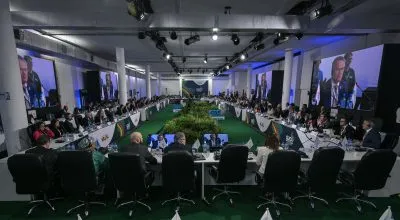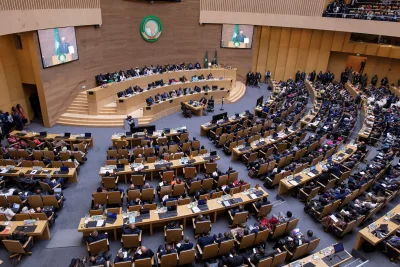It was third time lucky for Nana Akufo-Addo when he won December’s presidential election in Ghana. Yet another peaceful change of power cemented the country’s reputation for democratic politics. Akufo-Addo takes the helm of what is perhaps the most broadly based economy in the region and one that has grown rapidly over the past decade.
Yet it has also struggled with high levels of debt and inflation in recent years, so he has plenty of challenges ahead. Ghana has a great deal going for it but the previous government got ahead of itself in terms of borrowing.
The gold mining and cocoa sectors were already the mainstay of export revenues when large reserves of commercial oil were discovered on the Jubilee Field in 2007, adding another strand to an already strongly growing economy. But production has not ramped up as quickly as previously hoped, while oil prices over the past two years have been disappointingly low, and government expenditure has failed to reflect this.
In 2015 Accra turned to the IMF for $918m in loans, which were dependent on structural reforms. This is something the new government intends to review.
The big challenge
While there may be subtle changes in economic policy under the new president, the broad thrust of the government’s strategy is unlikely to change. Ghana is likely to remain one of the more successful African economies in terms of growth levels, attractiveness to foreign investors and diversity, but the government’s big challenge will be tackling debt and cutting the deficit.
Public debt has now reached 70% of GDP, a huge figure given that Ghana benefited from debt forgiveness just a decade ago. The public deficit as a proportion of GDP has fallen from 10% but still stood at about 7% for 2016, far too high for comfort.
Akufo-Addo has criticised his predecessor, John Mahama of the centre-left National Democratic Congress, for going on a spending spree. As the candidate of the centre-right New Patriotic Party, he might be expected to slash expenditure.
However, he won the election on the back of a raft of new investment pledges. The new government seems to want to tackle the deficit through stronger economic growth rather than lower spending, which sounds much like the strategy of the previous government.
Economic priorities
The new president’s other policies include cutting corporate tax in order to boost growth and create employment, and tackling corruption. He is to launch investigations into any deals by the previous government that are perceived as suspicious but he has emphasised that there will be no witch hunt.
Akufo-Addo is also keen to finally see the development of the country’s bauxite reserves and the production of a wider range of crops. At present, the agricultural sector continues to rely heavily on cocoa exports.
To get the economy back on track, Akufo-Addo’s government needs to switch expenditure away from recurrent expenditure and towards capital investment, such as the power sector and transport infrastructure. Yet this seems unlikely to happen.
Malte Liewerscheidt, the senior Africa analyst at risk analysis company Verisk Maplecroft says: “Unfortunately, Akufo-Addo’s first decisions point towards continued wasteful spending. The president just increased the number of federal ministries by seven, suggesting rewarding loyal supporters takes precedence over reforming the economy.”
The annualised inflation rate stood at 15.4% at the end of 2016, a higher rate than in most other African states and far too high for comfort. Yet this is far from unusual, as annual Ghanaian inflation averaged 17.15% between 1998 and 2016.
There are some indications that inflation could fall this year. The domestic borrowing that fuelled price rises looks set to continue and the cedi may depreciate further, boosting the price of imports.
However, inflation was also driven by reductions in state subsidies on petrol, diesel, cooking fuel and electricity and these will gradually work their way out of the statistics over the next 18 months.
“One district, one factory”
Some of Akufo-Addo’s promises seem more left wing than right, including his pledge to put a factory in every district in the country, rather than leaving it up to the private sector to decide where best to locate manufacturing operations. However, although this policy is unlikely to see the light of day, it was born out of concern over the imbalance in economic development in the country, with northern districts missing out on the investment boom enjoyed by the coastal strip.
His promise to give more power to local government is more likely to be enacted. The former chief economist at the Bank of Ghana, Dr AO Abudu, argues that local authorities should be able to raise taxation. He believes that Accra, for instance, should be able to generate more of its own revenue itself, leaving the government to direct more of its resources at poorer, more rural parts of the country.
Liewerscheidt comments: “It remains to be seen whether lofty campaign promises such as ‘one district, one factory’, ‘one village, one dam’ and ‘one constituency, one million dollars per year’ will actually see the light of day. Excessive spending on prestige projects risks throwing the country back into a public debt crisis from which it has barely recovered.”
However the government achieves it, it needs to drastically cut the deficit in order to stop public debt from ballooning further out of control. This will be the biggest test of Akufo-Addo’s time in office.
Annual economic growth averaged 6.92% between 2000 and 2016, so talk of 7% annual growth over the next few years is reasonable but it may need to be accompanied by either lower spending or higher taxes if his presidency is to be viewed as a success.
Neil Ford
Want to continue reading? Subscribe today.
You've read all your free articles for this month! Subscribe now to enjoy full access to our content.
Digital Monthly
£8.00 / month
Receive full unlimited access to our articles, opinions, podcasts and more.
Digital Yearly
£70.00 / year
Our best value offer - save £26 and gain access to all of our digital content for an entire year!
 Sign in with Google
Sign in with Google 



